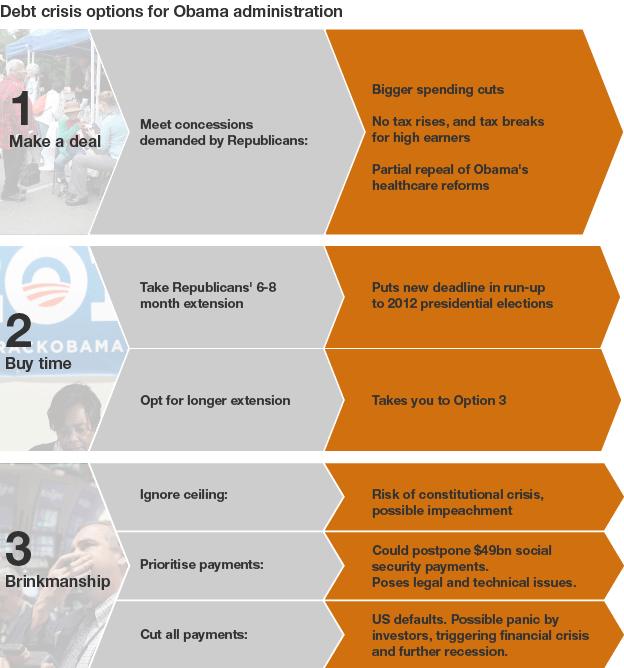US debt limit: Obama and Boehner trade blows on impasse
- Published
- comments
President Obama says a significant number of Republicans in Congress are insisting on a "cuts-only approach"
US President Barack Obama and Republican House Speaker John Boehner have blamed each other for the standoff over the federal debt crisis, as a deadline to avert a default looms.
Mr Obama condemned the Republicans' insistence on steep budget cuts and warned of a "reckless" outcome if the debt ceiling is not raised by Congress.
Mr Boehner responded by accusing the president of seeking a "blank cheque".
The US risks default without a deal to raise the borrowing limit by 2 August.
The federal government runs a budget deficit that topped $1.5tn (£920bn) this year, and has amassed a national debt of $14.3tn.
'Balanced approach'
Votes to raise the US debt limit have historically been a matter of routine in the US Congress, but this year, Republicans - buoyed by a newly elected crop of fiscal conservatives - have refused to agree to a debt increase without significant reductions in the budget deficit.
In negotiations, the chief sticking points are Republican resistance to raising taxes and the Democrats' desire to protect social programmes for the poor and elderly, and a public pension scheme.
In a live televised address on Monday night, Mr Obama said: "Republican House members have essentially said that the only way they'll vote to prevent America's first-ever default is if the rest of us agree to their deep, spending cuts-only approach."
The president reiterated his call for a "balanced approach", based on a mixture of spending cuts and tax increases on the rich.
He said the only reason this was not "on its way to becoming law right now is because a significant number of Republicans in Congress are insisting on a cuts-only approach".
That approach, he added, "doesn't ask the wealthiest Americans or biggest corporations to contribute anything at all".
He said: "Most Americans, regardless of political party, don't understand how we can ask a senior citizen to pay more for her Medicare before we ask corporate jet owners and oil companies to give up tax breaks that other companies don't get."
Clock ticking
Responding to the president immediately after his speech, Mr Boehner insisted the US government's "spending binge" was over.
Republican House Speaker John Boehner: "The sad truth is the president wanted a blank cheque six months ago and he wants a blank cheque today"
"The president has often said we need a 'balanced' approach - which in Washington means: we spend more... you pay more. Having run a small business, I know those tax increases will destroy jobs."
Mr Boehner agreed the US "cannot default on its debt obligations", but showed no indication he or his Republican caucus were willing to compromise on tax increases.
And he called on Democrats to approve Republican proposals.
The president and Republican and Democratic leaders of the House and Senate have been negotiating for weeks over legislation to raise the debt ceiling and cut the nation's budget deficit.
The talks have broken down several times. In order to become law, any plan would require agreement from disparate factions within both parties and to pass both chambers of Congress.
On Tuesday, IMF chief Christine Lagarde pressed the US to resolve the stalemate, warning the country could face another jobless recovery.
"The clock is ticking and clearly the issue needs to be resolved immediately," Ms Lagarde told the Council on Foreign Relations in New York.
Protecting social programmes
In Monday's latest round of negotiations, Senate Democrats introduced a proposal that would trim $2.7tn (£1.66tn) over a decade.
The plan would protect social programmes for the poor and elderly and a public pension programme - all popular among Democrats. It would not raise new tax revenue.
House Republicans, meanwhile, unveiled their own plan that included $1.2tn (£736tn) in cuts caps on future spending, and offered a $1tn debt ceiling increase - not enough to last through the 2012 election.
In his White House address later, Mr Obama firmly rejected the Republican plan, in part because it would require another round of debt limit talks in six months.
"We know what we have to do to reduce our deficits," he said. "There's no point in putting the economy at risk by kicking the can further down the road."
He endorsed the Senate Democrats' plan as "a much better path", though one that would fall short of his goals to reform the tax system and social programmes.
If the debt ceiling is not raised, the US Treasury could run out of money to pay all of its bills - which could lead to interest rate rises, threaten the US economy and in turn the global recovery.
